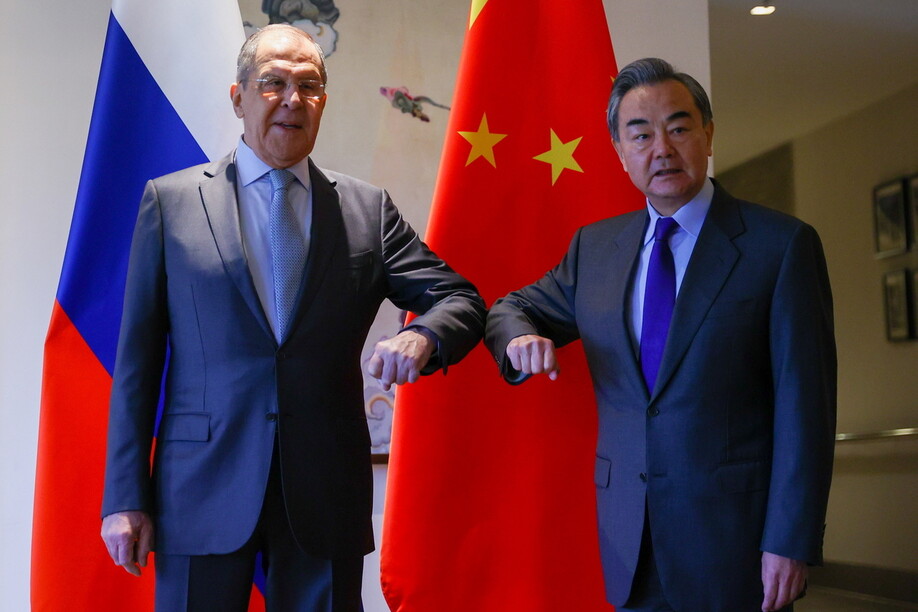Russian Foreign Minister Sergei Lavrov, who visited China, released a photo of Wang’s elbow-to-elbow greeting with the Chinese Foreign Affairs Commissioner and Foreign Minister in Guilin, Guangxi Zhuang Autonomous Region on the 23rd. Guilin/EPA Yonhap News
When the European Union (EU) imposed sanctions on China on the 22nd (local time) over the suppression of Uighur human rights in the western Xinjiang region of China, China immediately responded with counter-fire sanctions. As the United States, the United Kingdom, Canada, Australia, and New Zealand stepped up sanctions against China, Western countries over the Uighur issue became a siege of China. The simultaneous sanctions of Western countries against China came after the US and China clashed violently at high-level talks in Alaska on the 18th and 19th. It was also coincided with US Secretary of State Tony Blingen’s visit to Europe on the 22nd and 25th. The key tone of the US administration’s pressure on China by rallying alliances with values such as human rights and democracy in diplomacy, and the response of English-speaking Western countries to it perfectly fit. The first step is the European Union. The European Union imposed travel and economic sanctions on four Chinese officials and one related department in response to the repression of the Uighurs. The sanctioned targets are Wang Jun-jeong, the secretary of the Xinjiang Production and Construction Corps Party Committee, Chen Ming-Gou, the head of the Xinjiang Public Security Bureau, the former Xinjiang Party Committee secretary, Zhu Hairun, the secretary of the Xinjiang Political Law Committee, Wang Mingshan, and the Public Security Bureau of the Xinjiang Production and Construction Corps. The EU has imposed sanctions on China for the first time since it imposed an arms embargo during the Tiananmen (Tiananmen) crisis in 1989 when the Chinese government suppressed democratization protests by citizens by force. International human rights groups and the United Nations Committee on the Elimination of Racial Discrimination have criticized the Chinese authorities for violating human rights by collectively detained and mobilized more than 1 million ethnic minorities in Xinjiang, including the Uighurs, on the basis of so-called’reeducation’. The United States also announced that Wang Jun-jeong and Chen Ming-guo were added to the list of sanctions. Zhu Hairun and Wang Mingshan were previously subject to US sanctions. In a statement, Blincoln made a statement that “the United States is committed to exercising strong leadership in international efforts to combat serious human rights abuses.” In a statement, the US State Department and the Treasury Department warned China that “we will coordinate with like-minded partners to take further action.” The United Kingdom, Canada, Australia and New Zealand also made a joint statement with the European Union and the United States, saying, “We will continue to focus on China’s human rights violations together. “We come together and demand justice for those suffering from kidneys.” As shown in the joint statement, the sanctions against China were deliberately united by Western countries to attack the world, emphasizing the human rights abuses in Xinjiang, China’s sensitive area. US Secretary of State Blincoln visited South Korea and Japan on the 15th to 18th, criticizing China by discussing the issue of height, and on the 18th in Alaska, he brought up human rights issues, including Xinjiang, in the presence of Yang Jietsu, a political officer in charge of diplomacy in the Chinese Communist Party. Minister Blincoln attends a meeting of the Foreign Ministers of the North Atlantic Treaty Organization (NATO) in Brussels, Belgium on the 23rd and 24th to discuss strengthening the pan-Atlantic alliance. From the US point of view, after confirming the strengthening of key Asian alliances, after going through a rough exploration battle with China, it has increased’compression of China with alliances’ on the road to reaffirm the European alliance. China has rebelled against it. Chinese Foreign Minister Wang Yi said in a meeting with Russian Foreign Minister Sergey Lavrov on the 23rd. You have to know that it has passed.” In a joint statement released after the meeting, the foreign ministers of the two countries emphasized that “there is no standard model for democracy, and other countries should recognize the legal right of sovereign states to take their own development paths.” Prior to this, the Ministry of Foreign Affairs of China issued a statement the day before, saying, “The EU’s unilateral sanctions based on lies and misinformation are a serious interference with China’s internal affairs, a violation of international laws and norms, and seriously harm China-EU relations.” “We will severely harm our sovereignty and development interests, and we will sanction 10 individuals and 4 institutions who have maliciously spread false information and false information.” China’s sanctions included a large number of active-duty politicians, including Reinhard Betty Copper, chairman of the European Parliament’s China Relations Committee and Michael Galler, chairman of the Taiwan Friendship Group of the European Parliament. In addition, the European Parliament’s Human Rights Subcommittee and the Mercator Institute, a renowned German research group specializing in China, have also been listed as subject to sanctions. The government said that the Chinese Ministry of Foreign Affairs had called the European Union ambassador to China Nikola Shafu on the night of the 22nd to protest the sanctions decision and notified the countermeasures. Correspondent Jung In-hwan, Beijing/Hwang Jun-beom, Washington [email protected]
newsletter
Every morning, every Thursday day
A friendly newsletter that will save you from the flood of news.
Meet
